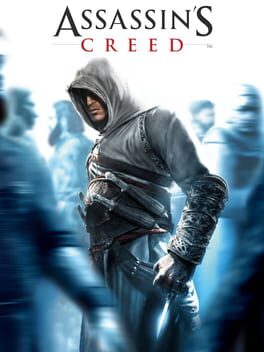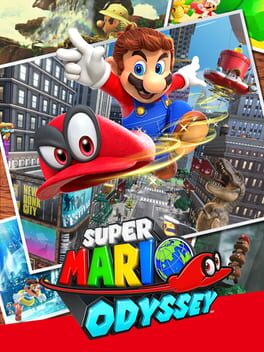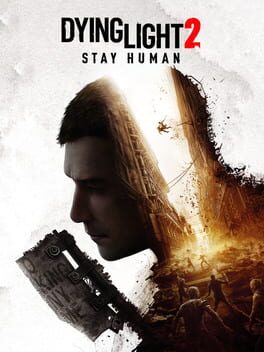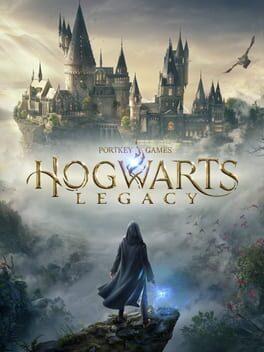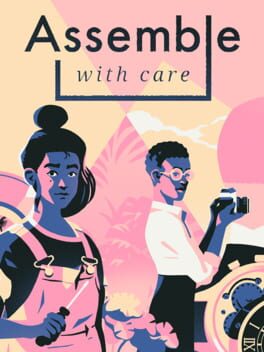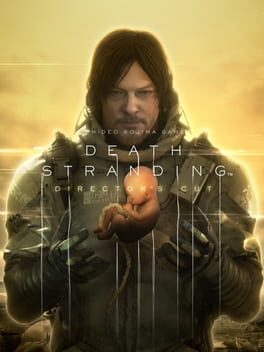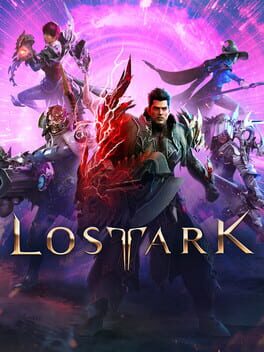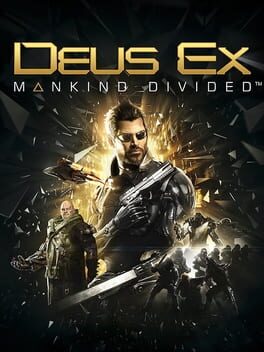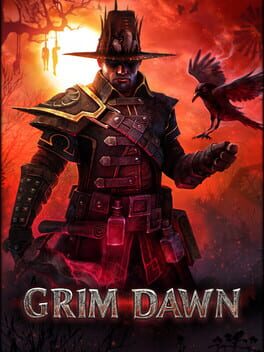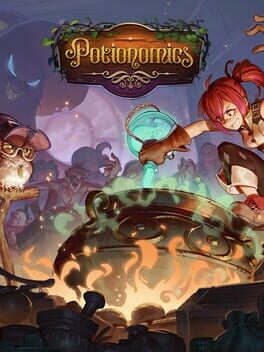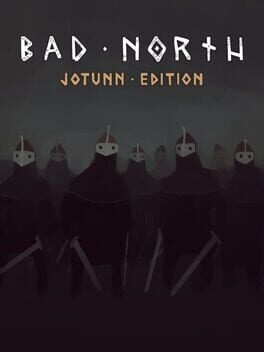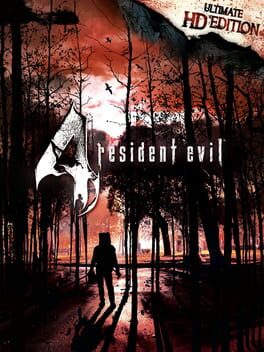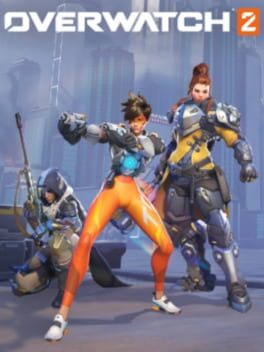2007
Judging this by the standards of 2023 might not be the fairest thing, but by this metric this game is pretty awful. Not for the janky parkour, the long dialog scenes, or the simplistic combat and parkour systems, but just for how intent it is on wasting your time. You can't just go and kill some guys, you gotta do side-quests, and climb the towers, and sit through seemingly endless tutorials just to BEGIN to complete the objective Altair was tasked with completing.
I don't mind it's meandering pacing and an over-abundance of NPC conversations, because, honestly, I kinda like just how slow the game is. I don't know if I'd call it immersive per say, but the charm of this one would have definitely be lost had it had the movement and mission structure of it's sequels.
Assassin's Creed is not as bad as people say. The influence and innovation brought by it is immense, and while this game might not be so fun or mindblowing today, I can appreciate it's archaic quirks for what would become of them later on. I know we're all AAA-gaming haters here, but Assassin's Creed is responsible for a lot of great games we've gotten since it's release, and I think it's important to recognize that. Besides that, while it is the origin of the timeline were Assassin's Creed Valhalla exists, this game itself is, by contrast, very unique and bold in it's concepts, as weird as calling an AC game "unique" and "bold" might sound today.
Also yeah, the voice acting is amazingly bad, might be worth it to check this one out just for that
I don't mind it's meandering pacing and an over-abundance of NPC conversations, because, honestly, I kinda like just how slow the game is. I don't know if I'd call it immersive per say, but the charm of this one would have definitely be lost had it had the movement and mission structure of it's sequels.
Assassin's Creed is not as bad as people say. The influence and innovation brought by it is immense, and while this game might not be so fun or mindblowing today, I can appreciate it's archaic quirks for what would become of them later on. I know we're all AAA-gaming haters here, but Assassin's Creed is responsible for a lot of great games we've gotten since it's release, and I think it's important to recognize that. Besides that, while it is the origin of the timeline were Assassin's Creed Valhalla exists, this game itself is, by contrast, very unique and bold in it's concepts, as weird as calling an AC game "unique" and "bold" might sound today.
Also yeah, the voice acting is amazingly bad, might be worth it to check this one out just for that
2017
Dying Light 2 is yet another example of feature creep ruining a promising sequel that could've outshone the original completely, but failed. It's not a complete faliure, of course: I just LOVED the improvements they've made to parkour, how they retooled some combat mechanics, and the way they tackled night gameplay. But with it's fuck-huge open world with icons constantly assaulting your senses, it's hard to just sit back and enjoy the good parts of this one, and the story is immensely dissapointing. The OG Dying Light didn't have the best story either, but at least there were memorable and fun characters supported by great cutscene direction and voice acting; now it's just cliche morons bumbling their way into an anti-climactic ending. Really dissapointing. If Techland intends on making a third game someday, I'd want them to narrow it's scope a little bit, or at least introduce some more sandbox elements and greater enemy variety, not double down on scripted idiocy or live-service elements most players won't even touch.
2023
Despite all the creative and welcome changes to the original RE4's story, locations, boss encounters and puzzles, I'd say the best part of 4make was definitely combat. The whole game feels like a dream you'd have about playing RE4, where everything is sligthly or A LOT cooler and more dramatic, and all the little things they added to spice up combat seal this package up incredibly well. There's nothing quite like knife-parrying three dudes in a row and then punching one in the face so that the whole group staggers down to the floor, where they ultimately get disintegrated by a well-placed mine or frag grenade. And, of course, the new abilities Leon possesses really do add a lot to boss fights, which I honestly never liked in the original.
The thing is, though, RE4 is my comfort game. I can literally at any time just decide to download it off my steam library and play through a couple levels, because, for various reasons, that game was laser-focused on pushing you forward with a constant stream of upgrades and set-pieces, which made for an experience not dissimilar to an over-the-top action film: you just put it on and have a good time. In 4make, however, EVERYTHING is expanded upon, including the way you interact with the world. Now there are a lot more secrets, challenges, even fucken side-quests to tackle, which play on your completionist tendencies, and bet on you enjoying the exepctionally satisfying combat-loop, to make you keep playing the game as long as you can. And with how stingy this game can be about upgrades and repairs to the knife, this makes the pacing pretty uneven for most players, myself included.
Concidering all that, I can't say this remake straight up replaces the original, or that it is holistically better. Even though just about every bit and piece of Resident Evil 4 was rebuilt in a more sophisticated and impressive manner, the sum of the remake's parts don't come together quite as neatly as that of the OG. The mercenaries are so much better though omg
The thing is, though, RE4 is my comfort game. I can literally at any time just decide to download it off my steam library and play through a couple levels, because, for various reasons, that game was laser-focused on pushing you forward with a constant stream of upgrades and set-pieces, which made for an experience not dissimilar to an over-the-top action film: you just put it on and have a good time. In 4make, however, EVERYTHING is expanded upon, including the way you interact with the world. Now there are a lot more secrets, challenges, even fucken side-quests to tackle, which play on your completionist tendencies, and bet on you enjoying the exepctionally satisfying combat-loop, to make you keep playing the game as long as you can. And with how stingy this game can be about upgrades and repairs to the knife, this makes the pacing pretty uneven for most players, myself included.
Concidering all that, I can't say this remake straight up replaces the original, or that it is holistically better. Even though just about every bit and piece of Resident Evil 4 was rebuilt in a more sophisticated and impressive manner, the sum of the remake's parts don't come together quite as neatly as that of the OG. The mercenaries are so much better though omg
2023
Hog Leagcy is, for the most part, just another AAA open-world faux-rpg, and by the nature of this type of game, this one wasn't engaging, as much as it was addictive: constant stream of objectives and new things to try out keep you going, stimulated by great presentation, pretty fun combat, and some alright-ish set-pieces. But all the myriad rough edges and underdeveloped systems betray a game that outgrew it's budget and time constraints with it's scope, so even the addiction is easily broken.
All this to say - I dropped this one after like 10 hours and I doubt I'll ever want to go back to it.
Have to say though, it is funny how lefties painted this game as JKR's antisemitic bigot-baby, when the actual problem with HL's story is that it's slavishly devoted to it's canon and sweeps SO MUCH bad shit from the Harry Potter books under the rug, you'd think it was extension charm-ed. Like, seriously, this game wants you to believe that Hogsmead has a 100% accepted trans-woman in it's midst, that Hogwarts' student body has all the colours of the rainbow, that racism is not an inherent part of Slytherin, and that House Elfs are...fine? And that it all makes sense with the all-white, all-straight, all-cis, all-fucking-bigoted-and-stupid original canon. Sure, mate.
All this to say - I dropped this one after like 10 hours and I doubt I'll ever want to go back to it.
Have to say though, it is funny how lefties painted this game as JKR's antisemitic bigot-baby, when the actual problem with HL's story is that it's slavishly devoted to it's canon and sweeps SO MUCH bad shit from the Harry Potter books under the rug, you'd think it was extension charm-ed. Like, seriously, this game wants you to believe that Hogsmead has a 100% accepted trans-woman in it's midst, that Hogwarts' student body has all the colours of the rainbow, that racism is not an inherent part of Slytherin, and that House Elfs are...fine? And that it all makes sense with the all-white, all-straight, all-cis, all-fucking-bigoted-and-stupid original canon. Sure, mate.
2019
I hate to be harsh on small and passionate indie devs, but I don't think this game achieved any goal beyond the most superficial, and even those achievements are questionable.
Everyone already mentioned how the puzzle mechanics don't have any challenge to them at all, but challenge is obviously not what the devs were going for here. If I were to guess the intent here, it was to impart onto the player the feeling of enjoyable tactile tinkering with small things, and also of how these things connect to real stories of real people's lives. And to be cute cosy relaxing chill vibes nice game, of course.
Whatever you can say about Assemble With Care, at least the first objective was, like, way on it's way to being completed, as it is oddly satisfying to watch old gadgets and appliances be dissassembled, old parts replaced with new, and then reassambled again. Unfortunately, the game as a whole, and by extension the main gameplay mechanics weren't terribly well thought-out or polished, which leaves the frankly bland writing standing mostly alone in this field. And it can't quite manage on it's own, because the way the stories of the city's residents has been incorporated into the overall narrative just didn't work for me. It's just too blunt and rushed to really pull you in, with a lot of "Hey, can you fix my thing? It's a gift from my partner. Wish they were here still...ever since they're gone life hasn't quite been the same" from a lot of randoes you don't care about. I get that shorter narratives exist and you don't have to spend dozens of pages with a character to sympathise with them, but this is just bad pacing, man! I usually reserve the under 2.5 stars scores for some genuinely bad games, but this one was mostly just nothing for me, to the point where anything above 1 seems too generous.
Everyone already mentioned how the puzzle mechanics don't have any challenge to them at all, but challenge is obviously not what the devs were going for here. If I were to guess the intent here, it was to impart onto the player the feeling of enjoyable tactile tinkering with small things, and also of how these things connect to real stories of real people's lives. And to be cute cosy relaxing chill vibes nice game, of course.
Whatever you can say about Assemble With Care, at least the first objective was, like, way on it's way to being completed, as it is oddly satisfying to watch old gadgets and appliances be dissassembled, old parts replaced with new, and then reassambled again. Unfortunately, the game as a whole, and by extension the main gameplay mechanics weren't terribly well thought-out or polished, which leaves the frankly bland writing standing mostly alone in this field. And it can't quite manage on it's own, because the way the stories of the city's residents has been incorporated into the overall narrative just didn't work for me. It's just too blunt and rushed to really pull you in, with a lot of "Hey, can you fix my thing? It's a gift from my partner. Wish they were here still...ever since they're gone life hasn't quite been the same" from a lot of randoes you don't care about. I get that shorter narratives exist and you don't have to spend dozens of pages with a character to sympathise with them, but this is just bad pacing, man! I usually reserve the under 2.5 stars scores for some genuinely bad games, but this one was mostly just nothing for me, to the point where anything above 1 seems too generous.
Death Stranding was really easy to burn myself out with, so I can't imagine I'll be finishing it in the near future, but even so, the 50+ hours I spent with it were incredible and unlike any game I've ever played.
On paper, Death Stranding is any other open-worlder riddled with fetch-quest, grindy mechanics and samey mission structure. It's only when you appreciate the core mechanics do you start to see, that this is literally the best open-world game, up there Breath of the Wild and Elden Ring, though for completely different reasons. The story was weird to the point of incoherence and fart-sniffing at times, but the world is nevertheless gripping, with it's ruin and it's intensly human ways of navigating it, both physically and mentally. Hope I overcome my obsessive tendencies and actually finish this one for real some day
On paper, Death Stranding is any other open-worlder riddled with fetch-quest, grindy mechanics and samey mission structure. It's only when you appreciate the core mechanics do you start to see, that this is literally the best open-world game, up there Breath of the Wild and Elden Ring, though for completely different reasons. The story was weird to the point of incoherence and fart-sniffing at times, but the world is nevertheless gripping, with it's ruin and it's intensly human ways of navigating it, both physically and mentally. Hope I overcome my obsessive tendencies and actually finish this one for real some day
2018
I've played this for like three hours straight, looking for any semblance of challenge, good visuals, loot systems, or interesting enemies, and all came back null. The combat is pretty sweet, but nothing in the game really supports it, and it bombards you with skills right from the beginning which doesn't allow you to develop any idea of how your character should be played, and your playstyle or build are just chimeras. Whatever, man
It's weird how one game can be some of the best and some of the worst stuff you'd expect from AAA games at the same time. Mankind Divided has great gameplay and presentation, a fun story, a cool world, and some pretty awesome ideas, but awful performance and microtransactions at launch, weird budget and/or time cuts resulting in an unfinished main campaign, and a tacked-on multiplayer and companion app to scan fucking QR codes. A shame, too, because this "Deus Ex Universe" initiative could've been some of the best shit in videogames if it weren't for the Warner Bros. goofiness that somehow found it's way in Square Enix, trying to establish some sort of big franchise off the back of one successful game and a promising sequel you decide to not have enough faith in at the last minute, which only goes to ruin any prospects your franchise might have had in the first place. I hope that Eidos Montreal is now at least in a real position to make a real continuation of this game, because, though the social commentary isn't the best, the aesthetics and the immersive-simmness of the Deus Ex reboot games cannot be left by the wayside. Make Jensen kill God already, you fucking Canuks!
Also yeah the original Deus Ex is kinda boring and only post-ironically enjoyable today, don't even tell me otherwise.
Also yeah the original Deus Ex is kinda boring and only post-ironically enjoyable today, don't even tell me otherwise.
2016
Having now played a second ARPG in Grim Dawn, as well as having checked out this Path of Exile biz, I can now say that this genre might eventually someday turn out as one of my favourites.
Grim Dawn in particular is amazing: the pacing is almost immaculate, the story and worldbuilding is fun videogame shlock, and the gameplay is cool at how it insentivizes experimentation. The two-class system, specifically, was great. I thought it was a dumb gimmick at first, but as I moved through the two skill trees I developed a playstyle that seemed unique to what I've seen people do with other classes, and it helped me immerse myself in the world, where I was a grenadier-spellcaster freeze-shocking chtonic demons, cultists and outlaws into stunlocked hell. I also loved the customizability of your character, being able to tweek almost every aspect of your guy to perfection, from resistances to how your gear looks (the latter thanks to a DLC, but still). Probably the biggest stand-out feature of this one has got to be the Constitution system, whereby moving out of the way and not attacking for a bit restores lost HP up to a certain point. That made my biggest issue with other games of this kind - the fact that they're potion-chugging simulators without a foot in either offensive or defensive gameplay - gone entirely. Now I can just kite around the trolls and the demons, continuously dealing damage and actually paying attention to the micro gameplay, not just looking at the skills' cooldowns.
Of course it all doesn't help too much that the art-direction is bland and that the final boss (an emissary of a dark cosmic deity here to consume the world) is easy as shit, but the game is still fun. Definitely doing another playthrough after the DLC is done
Grim Dawn in particular is amazing: the pacing is almost immaculate, the story and worldbuilding is fun videogame shlock, and the gameplay is cool at how it insentivizes experimentation. The two-class system, specifically, was great. I thought it was a dumb gimmick at first, but as I moved through the two skill trees I developed a playstyle that seemed unique to what I've seen people do with other classes, and it helped me immerse myself in the world, where I was a grenadier-spellcaster freeze-shocking chtonic demons, cultists and outlaws into stunlocked hell. I also loved the customizability of your character, being able to tweek almost every aspect of your guy to perfection, from resistances to how your gear looks (the latter thanks to a DLC, but still). Probably the biggest stand-out feature of this one has got to be the Constitution system, whereby moving out of the way and not attacking for a bit restores lost HP up to a certain point. That made my biggest issue with other games of this kind - the fact that they're potion-chugging simulators without a foot in either offensive or defensive gameplay - gone entirely. Now I can just kite around the trolls and the demons, continuously dealing damage and actually paying attention to the micro gameplay, not just looking at the skills' cooldowns.
Of course it all doesn't help too much that the art-direction is bland and that the final boss (an emissary of a dark cosmic deity here to consume the world) is easy as shit, but the game is still fun. Definitely doing another playthrough after the DLC is done
2022
I think we all have gotten pretty used to the subconscious belief that, in this climate, good games reach the mainstream and become popular sooner or later, nevermind their genre, gameplay, aesthetics, and just the actual quality they’re working with. Potionomics, while some success is not out of the question for this one, it doesn’t seem like it’s going to be the next Superhot, Spelunky, or even Sythe: Digital Edition after all. There was (understandably) no marketing for this game, I’ve only seen one big-ish YouTuber talk about it, and basically no big outlets paid this game any attention. I guess that’s what you get for releasing almost day-in-day with Plague Tale 2 and withing a week of Mario-Plus-fucking-Rabbids. Gosh, not even Backloggd, a site full of pretentious indie-lovers and covert weaboos, noticed that this game came out, and the devs literally have the word VOR(e) in the name!
Jokes aside, my point is that it’s a shame this game hasn’t received the attention it deserved. It didn’t rock my world or anything, but for what it is, and what the sequel and/or DLCs building on it’s ideas could be, there are not a lot of games I’d LOVE to see become a franchise like this one.
“Why doe”, you ask? Well!
On your quest to quickly amass a number of ingredients, shop-upgrades and coins in your bank account necessary to win each new potion-brewing competition, you will meet a cast of wacky, deceptively simple and instantly endearing characters, all connected to the capital “C” Capitalist system this world is living under. And, aside from the aesthetics, the characters are probably the best part of Potionomics as a whole. They are fun with how they present themselves and how they interact with Sylvia, the main girl; they are intriguing with each relationship-level up revealing a bit more about them as people, as well as the stuff they had to go through in their past; they are, most importantly, extremely comfy. They give you a chance to breathe in-between frantically trying to come up with a good ingredient combo for your next potion, to relax and feel like Sylvia is not just a debt-bound slave to the market, but a person living her life, bonding with people she meets.
It was truly a shock just how well the characters and your little interactions with them worked for me; they almost perfectly support the stressful, anxiety-inducing timebomb that are the weekly potion contests, driving you to interact with these people as a form of genuine recreation. The cool thing here, also, is that the game doesn’t rely on the raw nature of these characters as NPCs with how expertly it wieves their stories and moments you spend with them into the “actual” gameplay – the card battles.
For every rank-up with each of your peeps’ relationship level you’re rewarded with a card, generally contextualized as a tactic they use to deal with stress, or self-contiousness, or people that they want to seduce into giving them more money for the cheap meade they serve at the tavern. Each characters’ card collection is tied to a theme or an attitude they’re associated with, like Shafron being a chill woodling lady, or Mint being a go-getter not afraid to go on adventures to prove herself to the lads at the Guild, or Quin, doing gay and being crimes. Each card comes with a lesson or wisdom of some kind, like how you should yell about how awesome you are to pump yourself up right into your customers’ faces, or be homosexual. And so, when using Baptiste’s cards to increase a customer’s patience meter and make it easier for you to grab their attention, you remember all the stories he recanted about the importance of empathy, compromise, and showbodiness when making deals, and you almost want to strike the same slightly goofy pose as Sylvia when trying to apply these lessons to the current haggling session. “Yes”, you say, “I will pretend to be your friend just so you will give me more money for this shitty Mana Potion, also play some guitar riffs for good measure”. Combining different NPCs’ cards into your deck is made intuitive that way, as channelling a charming guildmaster guy as you’re imitating confidence-incarnate in the form of an anthropomorphic sculptor walrus just makes sense.
All this, in addition to being tight as fuck, creates a sense that whatever it is you’re doing, whether it’s getting to know new people, going shopping or commissioning some fancy shop repairs, you’re progressing the story, deepening your connection with the supportives and the main character, and getting better at the game itself, whether it’s through upgrades or general knowledge of how to navigate the game’s systems. With the intent of the story seemingly being to be fun, intimate and full of friendship and panic, I’d say this simple yet ludicrously effective weaving of story into gameplay into story into gameplay is commendable, and indicative of the talent and skill of the guys and girls (and nbs) working at Voracious Games.
At the end of the day, the amazing thing about Potionomics is that, despite being a game with such accents put on time-management and stress-tolerance on the part of the player, your journey through it is made effortless through its writing and presentation, as well as the intuitiveness of it’s systems. It’s wild for me, a person who isn’t exactly in love with those “just chill and soak in the atmosphere” games like Abzu or Gris, to be having such a relaxing time with a game where you spend 20 actual hours in a rat race you HAVE to win in order to not get evicted, and it’s a testament to how crucial storytelling can be in getting a player into that flow-state where you feel just strong enough to not buckle under all the pressure you’re put under.
In conclusion,
Roxanne milkers in my mouth pls pls
Jokes aside, my point is that it’s a shame this game hasn’t received the attention it deserved. It didn’t rock my world or anything, but for what it is, and what the sequel and/or DLCs building on it’s ideas could be, there are not a lot of games I’d LOVE to see become a franchise like this one.
“Why doe”, you ask? Well!
On your quest to quickly amass a number of ingredients, shop-upgrades and coins in your bank account necessary to win each new potion-brewing competition, you will meet a cast of wacky, deceptively simple and instantly endearing characters, all connected to the capital “C” Capitalist system this world is living under. And, aside from the aesthetics, the characters are probably the best part of Potionomics as a whole. They are fun with how they present themselves and how they interact with Sylvia, the main girl; they are intriguing with each relationship-level up revealing a bit more about them as people, as well as the stuff they had to go through in their past; they are, most importantly, extremely comfy. They give you a chance to breathe in-between frantically trying to come up with a good ingredient combo for your next potion, to relax and feel like Sylvia is not just a debt-bound slave to the market, but a person living her life, bonding with people she meets.
It was truly a shock just how well the characters and your little interactions with them worked for me; they almost perfectly support the stressful, anxiety-inducing timebomb that are the weekly potion contests, driving you to interact with these people as a form of genuine recreation. The cool thing here, also, is that the game doesn’t rely on the raw nature of these characters as NPCs with how expertly it wieves their stories and moments you spend with them into the “actual” gameplay – the card battles.
For every rank-up with each of your peeps’ relationship level you’re rewarded with a card, generally contextualized as a tactic they use to deal with stress, or self-contiousness, or people that they want to seduce into giving them more money for the cheap meade they serve at the tavern. Each characters’ card collection is tied to a theme or an attitude they’re associated with, like Shafron being a chill woodling lady, or Mint being a go-getter not afraid to go on adventures to prove herself to the lads at the Guild, or Quin, doing gay and being crimes. Each card comes with a lesson or wisdom of some kind, like how you should yell about how awesome you are to pump yourself up right into your customers’ faces, or be homosexual. And so, when using Baptiste’s cards to increase a customer’s patience meter and make it easier for you to grab their attention, you remember all the stories he recanted about the importance of empathy, compromise, and showbodiness when making deals, and you almost want to strike the same slightly goofy pose as Sylvia when trying to apply these lessons to the current haggling session. “Yes”, you say, “I will pretend to be your friend just so you will give me more money for this shitty Mana Potion, also play some guitar riffs for good measure”. Combining different NPCs’ cards into your deck is made intuitive that way, as channelling a charming guildmaster guy as you’re imitating confidence-incarnate in the form of an anthropomorphic sculptor walrus just makes sense.
All this, in addition to being tight as fuck, creates a sense that whatever it is you’re doing, whether it’s getting to know new people, going shopping or commissioning some fancy shop repairs, you’re progressing the story, deepening your connection with the supportives and the main character, and getting better at the game itself, whether it’s through upgrades or general knowledge of how to navigate the game’s systems. With the intent of the story seemingly being to be fun, intimate and full of friendship and panic, I’d say this simple yet ludicrously effective weaving of story into gameplay into story into gameplay is commendable, and indicative of the talent and skill of the guys and girls (and nbs) working at Voracious Games.
At the end of the day, the amazing thing about Potionomics is that, despite being a game with such accents put on time-management and stress-tolerance on the part of the player, your journey through it is made effortless through its writing and presentation, as well as the intuitiveness of it’s systems. It’s wild for me, a person who isn’t exactly in love with those “just chill and soak in the atmosphere” games like Abzu or Gris, to be having such a relaxing time with a game where you spend 20 actual hours in a rat race you HAVE to win in order to not get evicted, and it’s a testament to how crucial storytelling can be in getting a player into that flow-state where you feel just strong enough to not buckle under all the pressure you’re put under.
In conclusion,
Roxanne milkers in my mouth pls pls
I thought that revisiting Bad North a year later would make me like the game more, but my opinion barely changed. I still think that the game is wonderful when it comes to extreme condensation of RTS-trappings into a roguelike formula, and for what it's worth, the bones of a great roguelike are very much present here. Calculating how many commanders to send on which islands to get which results is very fun, in the same way that a simple puzzle game or a quick math quiz can be fun, with the added bonus of a great visual style and servicably crunchy sound-design.
However, the game is also still extremely unbalanced. I mentioned in my first review how basically 80% of a regular playthrough will either be a cake-walk or impossible to have any fun with, and I still think that, basically, Bad North has 2 general states: easy beyond belief and hard beyond reason. For the "Hard" difficulty, the ratio is somewhat scewed towards the latter, but the amount of times a player enters a true flow-state with Bad North's gameplay loop is still abysmally low. I wish that more thought was given to enemy types and how items work, because the game we got is more akin to rock-paper-scissors with some nice micro and item cooldown-managment.
This game is, like many roguelikes, pretty damn addictive, so I might return to it just for the hardest difficulty, but at this point I feel like I have well and truly reached the limits of the complexity and challenge Bad North has to offer
However, the game is also still extremely unbalanced. I mentioned in my first review how basically 80% of a regular playthrough will either be a cake-walk or impossible to have any fun with, and I still think that, basically, Bad North has 2 general states: easy beyond belief and hard beyond reason. For the "Hard" difficulty, the ratio is somewhat scewed towards the latter, but the amount of times a player enters a true flow-state with Bad North's gameplay loop is still abysmally low. I wish that more thought was given to enemy types and how items work, because the game we got is more akin to rock-paper-scissors with some nice micro and item cooldown-managment.
This game is, like many roguelikes, pretty damn addictive, so I might return to it just for the hardest difficulty, but at this point I feel like I have well and truly reached the limits of the complexity and challenge Bad North has to offer
This is like my 5th or 6th run of this game, and I've played it so much because Resident Evil 4 is just one of those games that feel unimaginably amazing to play, and that's honestly the best thing I can say about it. The tank controls, fairly weird-by-modern-standards aiming and awkward QTEs might have been off-putting at first, but once you get into the rythm it all just feels like touching the finest or silks of squeezing some really, really nice tits.
It's a good thing too that the enemy designs, the weapons, the pacing and not the bosses are incredible and still tower over most third-person-shooters released over (almost) two decades since this games' release. In that sense, RE4 is the prime example for me, personally, of how games don't just exist in terms of console specs and graphical and rendering limitations, but are in a complicated, viciously demanding art-form that takes inginuity and all the luck one can get to truly create a masterpiece. For this game, the stars have mostly aligned, the creators were genius, and a masterpiece it is, indeed. And just like there may never be a crime drama better than Breaking Bad and a pair of tits better than ma wife's, it's possible that RE4 is just about the best action-horror TPS we'll ever see. That remake is looking good doe ngl
P.S.
The bosses do suck a lot IMO
It's a good thing too that the enemy designs, the weapons, the pacing and not the bosses are incredible and still tower over most third-person-shooters released over (almost) two decades since this games' release. In that sense, RE4 is the prime example for me, personally, of how games don't just exist in terms of console specs and graphical and rendering limitations, but are in a complicated, viciously demanding art-form that takes inginuity and all the luck one can get to truly create a masterpiece. For this game, the stars have mostly aligned, the creators were genius, and a masterpiece it is, indeed. And just like there may never be a crime drama better than Breaking Bad and a pair of tits better than ma wife's, it's possible that RE4 is just about the best action-horror TPS we'll ever see. That remake is looking good doe ngl
P.S.
The bosses do suck a lot IMO
2022
It's weird leaving a review for something that is supposed to be everchanging and never finished, but Overwatch 2 in it's current state is best described as "dissapointing yet hopeful". The promised single-player elements are non-existant, the more heavily monitized model of content delivery is frustrating especially if you, say, live in a region where paying for a premium Battle Pass is just not an option, and the the new heroes don't feel that exciting concidering how long ago they were announced and how they don't really bring all that much new to the game.
That said, the Battle Pass system promises more content at more regular intervals, the new balancing decisions like no stun and 5v5 are interesting and seem to make OW2 more quick-paced and frantic, and if we ever get those Hero Missions and singleplayer campaigns, they're going to be the best thing to happen to this universe since the pre-release OW1 cinematics and comics. All in all, OW2 is not really a sequel at the moment, but more of a flimsy fundation for a new game yet-to-come.
Also the new looks for the old heroes are kino as hell
That said, the Battle Pass system promises more content at more regular intervals, the new balancing decisions like no stun and 5v5 are interesting and seem to make OW2 more quick-paced and frantic, and if we ever get those Hero Missions and singleplayer campaigns, they're going to be the best thing to happen to this universe since the pre-release OW1 cinematics and comics. All in all, OW2 is not really a sequel at the moment, but more of a flimsy fundation for a new game yet-to-come.
Also the new looks for the old heroes are kino as hell
